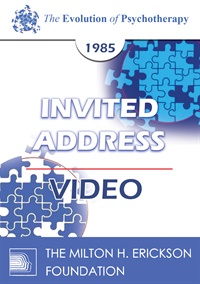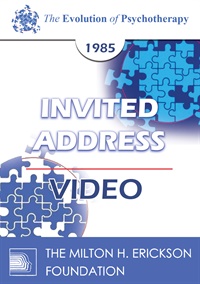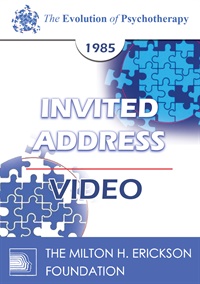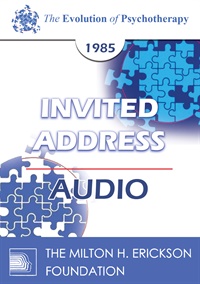
- Average Rating:
- Not yet rated
- Topic Areas:
- Invited Addresses | Gestalt | Psychotherapy
- Categories:
- Evolution of Psychotherapy | Evolution of Psychotherapy 1985
- Faculty:
- Miriam Polster | Robert L. Goulding, MD
- Duration:
- 1 Hour 11 Minutes
- Format:
- Audio Only
- Original Program Date:
- Dec 14, 1985
- Short Description:
- Invited Address Session 11 - Part 1 - Gestalt Therapy: Evolution and Application featuring Miriam Polster, PhD. With discussant Robert L Goulding, MD. Moderated by F Theodore Reid, Jr, MD.
- Price:
- $15.00 - Base Price
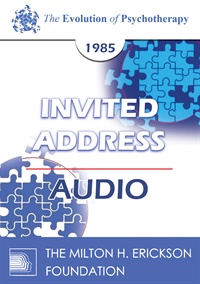
- Average Rating:
- Not yet rated
- Topic Areas:
- Invited Addresses | Storytelling | Psychotherapy
- Categories:
- Evolution of Psychotherapy | Evolution of Psychotherapy 1985
- Faculty:
- Erving Polster, PhD | Carl Rogers, PhD
- Duration:
- 1 Hour 20 Minutes
- Format:
- Audio Only
- Original Program Date:
- Dec 14, 1985
- Short Description:
- Description: With discussant Carl R Rogers, PhD. Moderated by F Theodore Reid, Jr, MD. Educational Objectives: To describe three ways of evoking stories in therapy. To name two purposes served by storytelling.
- Price:
- $15.00 - Base Price
- Average Rating:
- Not yet rated
- Topic Areas:
- Invited Addresses | Psychotherapy | Milton Erickson
- Categories:
- Evolution of Psychotherapy | Evolution of Psychotherapy 1985
- Faculty:
- Carl Rogers, PhD | Ruth Sanford, MA | Miriam Polster
- Course Levels:
- Master Degree or Higher in Health-Related Field
- Duration:
- 1:31:20
- Format:
- Audio and Video
- Original Program Date:
- Dec 15, 1985
- Short Description:
- Invited Address Session 12 - Part 1 - Rogers, Kohut, and Erickson: A Personal Perspective on Some Similarities and Differences featuring Carl Rogers, PhD, and Ruth C Sanford, MA. With discussant Miriam Polster, PhD. Moderated by F Theodore Reid, Jr, MD.
- Price:
-
Sale is $59.00
price reduced from Base Price - $59.00
- Average Rating:
- Not yet rated
- Topic Areas:
- Invited Addresses | Existential Therapy | Psychotherapy
- Categories:
- Evolution of Psychotherapy | Evolution of Psychotherapy 1985
- Faculty:
- Bruno Bettelheim | Rollo May, PhD
- Course Levels:
- Master Degree or Higher in Health-Related Field
- Duration:
- 1:26:32
- Format:
- Audio and Video
- Original Program Date:
- Dec 15, 1985
- Short Description:
- Invited Address 12 - Part 2 - Existential Therapy and the Future, featuring Rollo R May, PhD. With discussant Bruno Bettelheim, PhD. Moderated by F Theodore Reid, Jr, MD.
- Price:
-
Sale is $29.00
price reduced from Base Price - $59.00
- Average Rating:
- Not yet rated
- Topic Areas:
- Invited Addresses | Cognitive Behavior Therapy (CBT) | Rational Emotive Behavior Therapy (REBT) | Psychotherapy
- Categories:
- Evolution of Psychotherapy | Evolution of Psychotherapy 1985
- Faculty:
- Albert Ellis, PhD | Mary Goulding, MSW
- Course Levels:
- Master Degree or Higher in Health-Related Field
- Duration:
- 1:26:48
- Format:
- Audio and Video
- Original Program Date:
- Dec 15, 1985
- Short Description:
- Invited Address Session 13 - Part 1 - The Evolution of Rational-Emotive Therapy (RET) and Cognitive Behavior Therapy (CBT) featuring Albert Ellis, PhD. With discussant Mary M Goulding, MSW. Moderated by Aaron H Canter, PhD.
- Price:
-
Sale is $29.00
price reduced from Base Price - $59.00
- Average Rating:
- Not yet rated
- Topic Areas:
- Invited Addresses | Cognitive Behavior Therapy (CBT) | Psychotherapy
- Categories:
- Evolution of Psychotherapy | Evolution of Psychotherapy 1985
- Faculty:
- Aaron Beck, MD | Stowe Hausner, PhD
- Course Levels:
- Master Degree or Higher in Health-Related Field
- Duration:
- 1:23:41
- Format:
- Audio and Video
- Original Program Date:
- Dec 15, 1985
- Short Description:
- Invited Address Session 13 - Part 2 - A Dialogue on Cognitive Therapy with Beck and Hausner featuring Aaron T Beck, PhD. With co-faculty Stowe Hausner, PhD. Moderated by Aaron H Canter, PhD.
- Price:
-
Sale is $29.00
price reduced from Base Price - $59.00
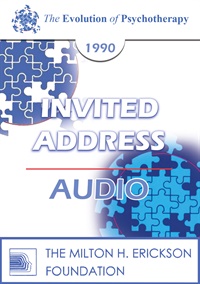
- Average Rating:
- Not yet rated
- Topic Areas:
- Invited Addresses | Buddhism | Meditation, Spirituality and Yoga | Ericksonian Hypnosis and Therapy Techniques | Psychotherapy | Strategic Therapy | Art and Creativity
- Categories:
- Evolution of Psychotherapy | Evolution of Psychotherapy 1990
- Faculty:
- Jay Haley, MA | William Glasser, MD
- Duration:
- 1 Hour 16 Minutes
- Format:
- Audio Only
- Original Program Date:
- Dec 12, 1990
- Short Description:
- A presentation of the influence upon therapy, particularly Strategic Therapy of Zen Buddhism. Similarities between therapeutic change and spiritual enlightenment are discussed in terms of the relationship between Master and trainee and therapist and client. The use of directives, of riddles, of absurd tasks, and the types of single interventions and paradoxical procedures are discussed. Examples of cases and Zen stories are compared. Zen, systems theory, and Erickson's strategic therapy are brought together.
- Price:
- $15.00 - Base Price
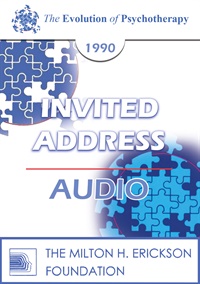
- Average Rating:
- Not yet rated
- Topic Areas:
- Invited Addresses | Psychotherapy | Storytelling | Metaphors
- Categories:
- Evolution of Psychotherapy | Evolution of Psychotherapy 1990
- Faculty:
- Cloe Madanes, HDL, LIC | Mary Goulding, MSW
- Duration:
- 1:35:43
- Format:
- Audio Only
- Original Program Date:
- Dec 12, 1990
- Short Description:
- Some new and some very old concepts will be discussed and illustrated with stories of psychotherapy cases.
- Price:
- $15.00 - Base Price
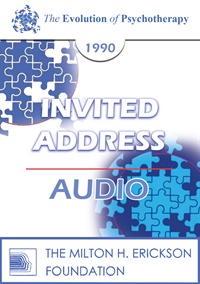
- Average Rating:
- Not yet rated
- Topic Areas:
- Invited Addresses | Social Issues | Family Therapy | History of Psychotherapy | Psychotherapy
- Categories:
- Evolution of Psychotherapy | Evolution of Psychotherapy 1990
- Faculty:
- Salvador Minuchin, MD | Mara Selvini Palazzoli, MD
- Duration:
- 1 Hour 26 Minutes
- Format:
- Audio Only
- Original Program Date:
- Dec 13, 1990
- Short Description:
- The theoretical concepts of family therapy have evolved since their beginnings in the 1950s. If we look at the political landscape of the '50s, '60s, '70s, and '80s, we see that family therapy parallels the political ethos of the time.
- Price:
- $15.00 - Base Price
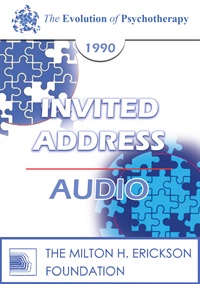
- Average Rating:
- Not yet rated
- Topic Areas:
- Invited Addresses | Experiential Therapy | Family Therapy | Psychotherapy
- Categories:
- Evolution of Psychotherapy | Evolution of Psychotherapy 1990
- Faculty:
- Carl Whitaker, MD | Paul Watzlawick, PhD
- Duration:
- 1 hour 29 minutes
- Format:
- Audio Only
- Original Program Date:
- Dec 13, 1990
- Short Description:
- The infrastructure of the family as an organism can be altered. A symbolic experience is a difference that makes a difference. This lecture describes how to precipitate a symbolic experience.
- Price:
- $15.00 - Base Price
Please wait ...


